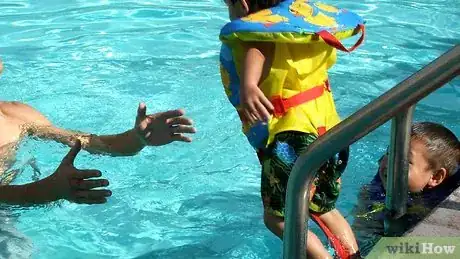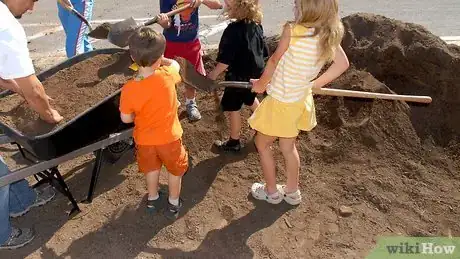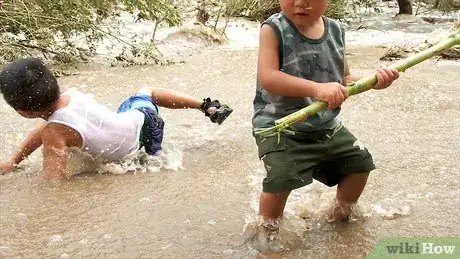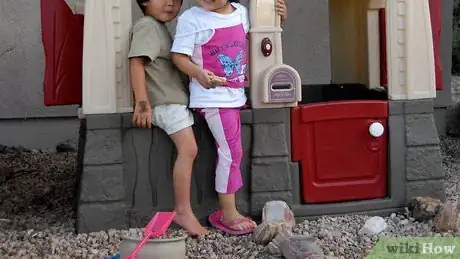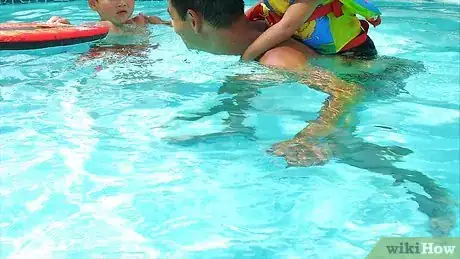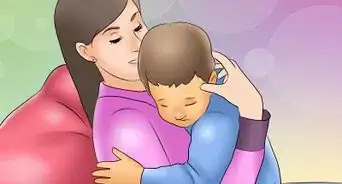This article was co-authored by Kathy Slattengren, M.Ed.. Kathy Slattengren is a Parent Educator and Coach and the Founder of Priceless Parenting. With over two decades of experience, Kathy specializes in helping parents build strong, loving relationships with their children. She has helped thousands of parents around the world through Priceless Parenting's online classes, presentations, coaching, and books. Kathy holds a Bachelor's degree in Computer Science and Psychology from The University of Minnesota and a Masters degree in Education and Instructional Design from The University of Washington. Kathy is a member of the National Parenting Education Network, the US Alliance to End the Hitting of Children, the International Society for Technology in Education, and a founding member of Parent Learning Link. Priceless Parenting has been featured on ABC News, Komo News, King 5 News, National PTA, Parent Map, and Inspire Me Today.
There are 7 references cited in this article, which can be found at the bottom of the page.
This article has been viewed 90,820 times.
Building a positive relationship with children is essential to their emotional and social growth. As a parent, educator, or caregiver, it is your responsibility to initiate and develop a positive relationship. You can build these positive relationships with children by providing them with opportunities, letting them know you care, keeping them safe, and treating them with respect. Here are a few things to consider if you want to learn how to develop a stronger, more productive bond with a child.
Steps
-
1Provide the children with more opportunities.[1]
- It is very common to automatically say "no" to a child when they ask if they can do something. This can range from leaving the table before they're done eating to playing in the park.
- You can't let kids do whatever they want, but limiting them just because you may not want to do something is not always the best approach.
-
2Let them help you.[2]
- If you are working on a home improvement project and the child asks if he or she can help, don't automatically say "no" because you know the job will get done faster.
- Find a reasonable task for the child to do, like handing you tools or working on cleaning something. This can help build trust between you and the child as well as boost their confidence.
Advertisement -
3Allow the child to explore.[3]
- Children are very curious and often feel the desire to explore new places. Let them explore when you know that the place you're at is safe and the people around are trustworthy.
- This will let the child know you trust him or her and are willing to let the child learn on his or her own. Saying "no" right away, because you may feel the child will get into something or you don't want to chase after him or her, is a legitimate concern, but doesn't always have to be there.
- Allowing the child to explore, and even get into trouble, can be a healthy learning experience.
-
4Inform the children of their importance in your life. Continue to communicate with them on a regular basis. Make sure they know they are safe and give them a sense of belonging.
- Introduce them to friends and family members.
- Ask them questions about their lives and ask if they need any help with something that may be going on at school or daycare.
- Place pictures of them around your home.
-
5
-
6Refrain from favoritism and spoiling the children.[6]
- It is not uncommon for parents to win affection and effectively control their child's behavior by using a reward system or by giving him or her whatever he or she desires.
- Although this might appear to make the child happy and keep your relationship positive, in the long run it does not work. Children often end up demanding and grow up with a sense of entitlement.
- Instead, reward them for something they have done right as opposed to trying to stop doing something wrong.[7]
- When you choose not to spoil your kids, you're teaching them self-control in the long run, which is essential to happiness in life.
Expert Q&A
-
QuestionHow do you argue effectively with kids?
 Kathy Slattengren, M.Ed.Kathy Slattengren is a Parent Educator and Coach and the Founder of Priceless Parenting. With over two decades of experience, Kathy specializes in helping parents build strong, loving relationships with their children. She has helped thousands of parents around the world through Priceless Parenting's online classes, presentations, coaching, and books. Kathy holds a Bachelor's degree in Computer Science and Psychology from The University of Minnesota and a Masters degree in Education and Instructional Design from The University of Washington. Kathy is a member of the National Parenting Education Network, the US Alliance to End the Hitting of Children, the International Society for Technology in Education, and a founding member of Parent Learning Link. Priceless Parenting has been featured on ABC News, Komo News, King 5 News, National PTA, Parent Map, and Inspire Me Today.
Kathy Slattengren, M.Ed.Kathy Slattengren is a Parent Educator and Coach and the Founder of Priceless Parenting. With over two decades of experience, Kathy specializes in helping parents build strong, loving relationships with their children. She has helped thousands of parents around the world through Priceless Parenting's online classes, presentations, coaching, and books. Kathy holds a Bachelor's degree in Computer Science and Psychology from The University of Minnesota and a Masters degree in Education and Instructional Design from The University of Washington. Kathy is a member of the National Parenting Education Network, the US Alliance to End the Hitting of Children, the International Society for Technology in Education, and a founding member of Parent Learning Link. Priceless Parenting has been featured on ABC News, Komo News, King 5 News, National PTA, Parent Map, and Inspire Me Today.
Parent Educator & Coach Resist the temptation to exchange hurtful words with your child and join them in an emotional battle. Instead, reply to them calmly by saying "That really hurt" or "It's not okay to talk to me that way."
Resist the temptation to exchange hurtful words with your child and join them in an emotional battle. Instead, reply to them calmly by saying "That really hurt" or "It's not okay to talk to me that way." -
QuestionMy grandniece is shy and sometimes hostile with me when I go long periods of time without seeing her. What can I do?
 Community AnswerChildren don't have the best memories, so sometimes they might not remember the people they've met before, even if they've spent a lot of time with them. Your grandniece is probably just nervous about being around someone she thinks she doesn't know. Make your home as inviting and welcoming as possible for her - make sure you have treats, games, movies, toys, or anything else she likes. This might help her become more comfortable quickly.
Community AnswerChildren don't have the best memories, so sometimes they might not remember the people they've met before, even if they've spent a lot of time with them. Your grandniece is probably just nervous about being around someone she thinks she doesn't know. Make your home as inviting and welcoming as possible for her - make sure you have treats, games, movies, toys, or anything else she likes. This might help her become more comfortable quickly.
References
- ↑ https://kidshealth.org/en/parents/nine-steps.html
- ↑ https://www.psychologytoday.com/us/blog/freedom-learn/201809/toddlers-want-help-and-we-should-let-them
- ↑ https://kidshealth.org/en/parents/exploring.html
- ↑ https://www.psychologytoday.com/us/blog/the-power-prime/201401/three-ways-raise-secure-children
- ↑ https://www.cdc.gov/parents/essentials/structure/rules.html
- ↑ https://www.webmd.com/parenting/features/spoiled-child
- ↑ https://www.cdc.gov/parents/essentials/consequences/rewards.html
